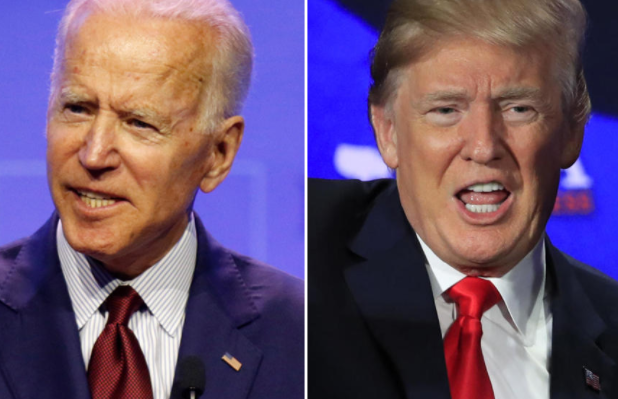| In a likely 2024 matchup, 46% of voters support former President Donald Trump, and 45% support President Joe Biden. Since December, Trump’s support decreased one point from 47% to 46%, while Biden’s increased two points from 43% to 45%.
In a hypothetical matchup between Biden and Haley, 38% support Haley, 37% Biden, and a quarter of voters (25%) are undecided.
With third-party candidates Robert Kennedy Jr., Cornel West, and Jill Stein added to the ballot, Trump’s lead over Biden increases to two points, 41% to 39%, while 5% support Kennedy Jr., and 1% Stein and West respectively. In a hypothetical matchup between Biden, Trump, and Haley, Trump’s lead expands to five points over Biden, 42% to 37%; 12% support Haley and 10% are undecided.
In the Democratic Primary, 72% of voters support Biden as the nominee, 4% Dean Phillips, and 4% Marianne Williamson. Nineteen percent are undecided.
“Biden has successfully strengthened his support among Democratic Primary voters, with undecided voters decreasing from 30% to 19% and his share of support increasing from 63% to 72%”, as highlighted by Spencer Kimball, Executive Director of Emerson College Polling. Kimball went on to say that “notably, this shift is particularly pronounced among young voters, with 66% of voters under 40 expressing their intention to vote for Biden nationally, up from 52% in the previous month.”
A majority of Republican Primary voters nationwide (73%) support Trump as their 2024 nominee, while 19% support Nikki Haley. Since last month’s survey which included four additional Republican candidates who have since suspended their campaigns, Trump’s support increased 13 points, from 64% to 77%, and Haley increased 10 points, from 14% to 24%.
“Haley’s strong performance among certain demographics in New Hampshire, such as college-educated and older voters, does not appear to translate to the same level of support nationally,” highlighted Kimball. “While she holds 30% support among college-educated voters nationally, Trump commands about 58%. Among voters over 50, Haley garners 21% support, while Trump enjoys 73%.”
Republican Voters were asked if Haley should stay in the race, or drop out. A majority (53%) think the former UN ambassador should drop out, while 34% think she should stay in the race, and 13% are neutral. Haley voters are supportive of her decision to stay in the race: 84% think she should remain in the race for the nomination.
Concern for the economy has waned among voters in the new year – 29% picked the economy as their top issue, a nine-point drop since December. Immigration is the top concern for 21% of voters, a 10-point increase from December, followed by healthcare at 14%, and threats to democracy at 11%.
“Immigration now leads as the primary concern for Republican voters, with 36% naming it the top issue, surpassing the economy at 30%,” stated Kimball. “Among independents, the economy remains the top concern with 32%, followed by immigration at 19%, and threats to democracy at 15%. Democrats, on the other hand, are divided on various issues, with 25% prioritizing the economy, 20% healthcare, 11% threats to democracy, 9% crime, and 8% each for abortion access and immigration.”
Voters who are most concerned about the economy continue to break for Trump (52%) over Biden (36%). However, in the December national poll, voters most concerned about the economy broke for Trump 60% to 30%, a 14-point difference. Voters who are most concerned about immigration continue to break for Trump over Biden by a wide margin, 81% to 14%.
This survey replicated a Field Research poll question from 1994, asking if voters think the 1986 Immigration Reform and Control Act that granted amnesty to over 1.5 million persons living in the country without documentation to apply for U.S. citizenship was a good thing or bad thing, looking back. The 1994 survey originally asked this of California voters, of which 49% found it to be a bad thing, 42% a good thing, and 9% had no opinion. The national results fielded 20 years later found 55% found it to be a good thing, and 45% bad.
- Voters in the West are most likely to report the amnesty law as being a good thing at 62%, followed by those in the Northeast at 55%, South at 54%, and Midwest at 48%.
Regarding whether or not the government in Israel should negotiate a settlement with Hamas allowing them to hold political offices if they agree to stop fighting, or if the government should continue fighting Hamas, 38% think Israel should continue fighting, 32% think they should negotiate, and 31% are unsure.
- A plurality of Democrats (43%) think Israel should negotiate with Hamas, while 29% think they should continue fighting, and 28% are neutral. A majority of Republicans (51%) think Israel should continue fighting, while 22% think they should negotiate with Hamas, and 27% are neutral. Independents are more split: 32% think they should continue fighting, 40% are neutral, and 28% think they should negotiate.
|



The difference of course between the two men is, one has been accused of fomenting violent sedition und subject to Article lll of the 14th amendment and may well have hung himself already? Jezsayn
Highest office needs a few good rules in place before a person can sit in this seat.